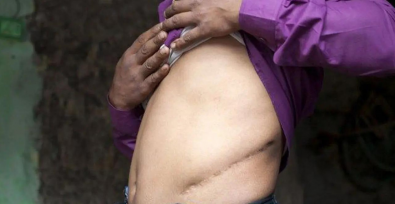Georgina, a 32-year-old woman from Malawi, envisions a promising future when she accepts an offer to work as a driver in Dubai. Little does she know, she and what turns out to be over 50 other women are trafficked to Oman, where they experience grueling forced labor, sexual exploitation, and abuse. Yet, in the depths of their despair, these women find a glimmer of hope through an unexpected source: a WhatsApp group initiated by Pililani Mombe Nyoni, a Malawian social media activist.
Stories from the women
It is not until the plane lands in Oman that Georgina realizes she has been deceived and is trapped by a family that forces her work punishing hours, seven days a week.
Georgina tells the BBC:
“I reached a point where I couldn’t take it,” she says, detailing how she got as little as two hours’ sleep.
She had not been there long when her boss began forcing her to have sex with him, threatening to shoot her if she said anything.
“It wasn’t only him,” she says. “He would bring friends and they would pay him after. I got badly injured. I became distraught.”
Blessings, another woman who is trafficked to Oman at 39 years old, leaves her four children with her sister Stevelia back home with the hopes of providing a better future for her family.
In the home that Blessings works in, she is severely burned, but her employer still does not let her leave.
Stevelia reports,
“The degree of the burns, trust me, I saw my sister losing her own life. I remember my sister said: ‘Sister, I came here because I needed a better life, but should I die, please take care of my kids.’ That hurt me.”
A beacon of hope
After several weeks of this nightmare, Georgina bravely posts on Facebook asking for help. Across the world, in New Hampshire, U.S., 38-year-old Malawian social media activist Pililani Mombe Nyoni sees her message. What starts as a solitary cry for help eventually spirals into a powerful digital community that changes the course of 54 women’s lives.
Nyoni contacts Georgina and has her remove the post for her own safety then gives Georgina her WhatsApp number, which begins to circulate in Oman.
“Georgina was the first victim. Then it was one girl, two girls, three girls,” said Nyoni.
Soon the WhatsApp group was full of voice notes and videos, some too harrowing to watch, detailing the horrific conditions the women were enduring. Many had their passports taken away as soon as they arrived, preventing them from leaving.
“I feel like I am in prison… we can never escape,” one said. “My life is really in danger,” another said.
The group becomes a space for emotional support and a platform for advocacy. Nyoni, determined to help these women, is introduced to Ekaterina Porras Sivolobova, founder of Do Bold. Do Bold is a charity that works with migrant workers in the Gulf countries, identifies victims of trafficking and forced labor, and negotiates with employers to release those trapped in modern slavery.
Sivolobova explains that the laws in Oman prohibit domestic workers from leaving their employers, no matter how they are treated. This encapsulates the essence of the kafala system, a scheme that perpetuates exploitation by tying vulnerable workers to their employers, leaving them susceptible to abuse and no way to escape.
After three months in Oman, Nyoni helps Georgina return to Malawi. She states, “After I helped Georgina, I felt so mad, felt so angry.” She raises the alarm within Malawi, and the government intervenes by calling on the authorities to bring the women home. The Malawi government spends more than $160,000 to bring the 54 women home.
“I never thought there would come a time that I would see my family again, my children,” says Blessings after her return.
A bigger problem
Through joint courageous efforts, the women were returned home, but their freedom still had to be bought, bringing attention to greater systemic issues.
Without safe and regulated migration that has safeguards for migrants and their families, the risk of human trafficking is exponentially higher. Additionally, when one is experiencing poverty and unemployment, often they are forced to accept offers from traffickers and unscrupulous employers. Poverty is the biggest driving factor behind human trafficking.
According to research by Do Bold published in the 2023 U.S. State Department Trafficking in Persons Report, there are around two million female domestic workers in the Gulf Arab States. In a conducted survey of 400 women in Oman, almost all were found to be victims of human trafficking.
A call to action
Any system that ties a human being to an employer needs to be overhauled. We must speak out and demand that governments protect migrants by ensuring safe migration to prevent and protect against human trafficking. Sign our petition to call for genuine anti-trafficking immigration policies.







Freedom United is interested in hearing from our community and welcomes relevant, informed comments, advice, and insights that advance the conversation around our campaigns and advocacy. We value inclusivity and respect within our community. To be approved, your comments should be civil.